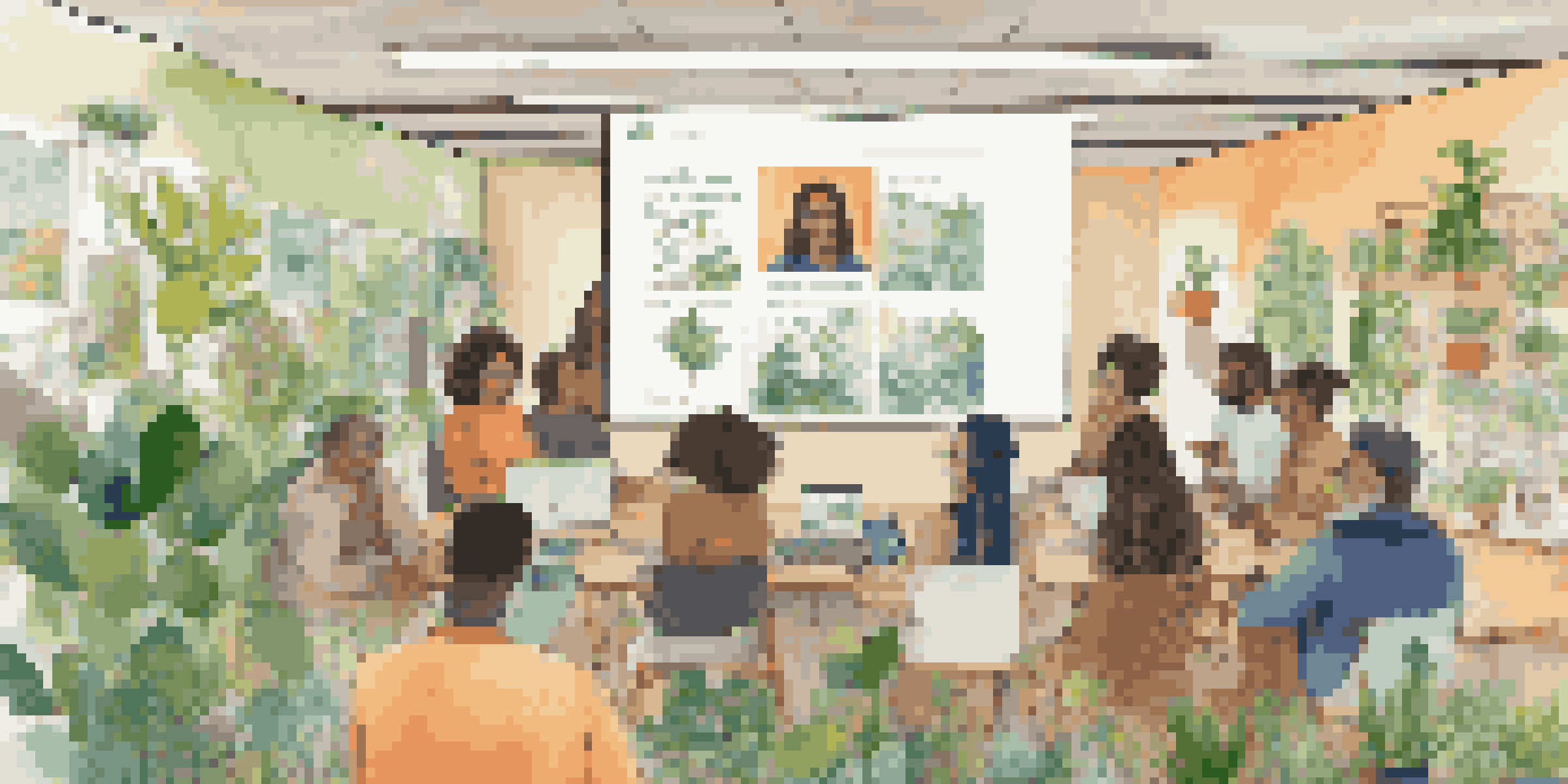The Impact of Shared Goals on Online Community Collaboration

Understanding Shared Goals in Online Communities
Shared goals are the common objectives that bind community members together. In online spaces, these goals can range from promoting a cause to completing a project. When individuals unite under a shared aim, it fosters a sense of belonging and purpose, making collaboration more effective.
Alone we can do so little; together we can do so much.
For instance, imagine an online forum dedicated to environmental activism. Members rally around the common goal of raising awareness about climate change. This shared vision not only motivates individuals but also enhances their commitment to the cause.
Ultimately, shared goals act as a guiding star, steering the community's efforts and ensuring that everyone is on the same page. This unity can lead to more innovative solutions and stronger connections among members.
The Role of Trust in Collaborative Efforts
Trust is a cornerstone of any successful collaboration, particularly in online communities. When members feel they can rely on each other, they are more likely to contribute actively towards shared goals. This trust is built through consistent communication and transparency.

For example, consider a collaborative writing project where each member has a specific role. If participants trust one another to meet deadlines and deliver quality work, the project is more likely to succeed. Trust reduces friction and encourages open dialogue, which is essential for problem-solving.
Shared Goals Foster Community Bonding
When community members unite around shared goals, it enhances collaboration and creates a sense of belonging.
In this way, trust not only strengthens relationships but also amplifies the effectiveness of collective efforts. As trust grows within a community, so does the potential for achieving shared goals.
Creating a Collaborative Culture Online
Establishing a collaborative culture is vital for any online community aiming to achieve shared goals. This involves fostering an environment where all voices are heard and valued. When members feel included and respected, their willingness to collaborate increases significantly.
The strength of the team is each individual member. The strength of each member is the team.
Take an online gaming community, for example. When players share strategies and support one another, it enhances their gaming experience. This culture of collaboration not only makes the game more enjoyable but also drives the community towards collective achievements.
By prioritizing a collaborative culture, online communities can create a positive feedback loop. The more collaboration occurs, the stronger the community becomes, which in turn encourages even more collaboration.
Leveraging Technology for Collaboration
Technology plays a crucial role in facilitating collaboration within online communities. Tools like forums, chat applications, and project management software make it easier for members to communicate and work together. These platforms can help keep everyone aligned with the shared goals.
For instance, a community focused on coding could use platforms like GitHub to collaborate on projects effectively. Members can track changes, suggest improvements, and merge ideas seamlessly. This not only streamlines the process but also enhances collective learning.
Trust Enhances Collaborative Success
Building trust among members encourages active participation and strengthens relationships, leading to more effective collaboration.
By leveraging technology, communities can break down geographical barriers and tap into diverse skill sets. This diversity can lead to richer discussions and more innovative solutions in pursuit of shared goals.
Encouraging Active Participation Among Members
Active participation is essential for the success of any collaborative effort. Encouraging members to engage regularly fosters a sense of ownership over shared goals. This can be achieved through various strategies, such as inviting feedback and recognizing contributions.
For example, a community dedicated to photography could host monthly challenges. By showcasing participants' works and offering constructive feedback, members feel more inclined to share their skills and perspectives. This not only boosts engagement but also enriches the community's collective knowledge.
When members actively participate, it creates a vibrant atmosphere where collaboration thrives. This dynamic environment is crucial for driving the community towards achieving its shared objectives.
Overcoming Challenges in Collaboration
Collaboration is not without its challenges, especially in online settings. Miscommunication, differing opinions, and varying levels of commitment can hinder progress toward shared goals. However, these obstacles can often be addressed through proactive measures.
For instance, if a community faces a disagreement on the direction of a project, open discussions can help clarify misunderstandings and align perspectives. By encouraging members to express their views respectfully, the community can find common ground and move forward together.
Celebrating Milestones Boosts Motivation
Acknowledging achievements within a community reinforces collaboration and inspires continued engagement among members.
Embracing flexibility and adaptability is key to overcoming these challenges. By fostering a culture that values problem-solving, communities can turn obstacles into opportunities for growth and innovation.
Celebrating Achievements and Milestones
Celebrating achievements is a vital aspect of maintaining motivation in online communities. Acknowledging milestones not only reinforces the value of collaboration but also strengthens the community bond. When members see their efforts recognized, it encourages continued participation.
For example, a community that successfully launches a new product could host a virtual celebration. Sharing success stories and highlighting individual contributions can create a sense of pride and accomplishment among members. This celebration not only honors the hard work but also inspires future collaboration.

By regularly celebrating achievements, online communities can cultivate a positive atmosphere that propels them toward even greater shared goals. This recognition fuels enthusiasm and commitment, making collaboration a rewarding experience.